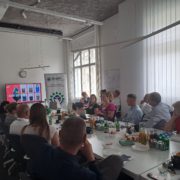“Towards a National Circular Economy Strategy for Hungary” – Circular Economy Academy I.
On April 4, 2023, the Circular Economy Academy was launched with great interest. At the first event of the webinar series, we presented the results of the SRSP/TSI project “Introducing the circular economy and managing the challenges of waste management”, which ended at the end of March 2023, with the help of representatives of the organizations participating in the project.
On behalf of the Prime Minister’s Office, Dóra Alexandra Arany, head of department, reported on the implementation of the project spanning more than three years, including the launch and work processes. She emphasized that, in addition to the three main priority areas, horizontal approaches play a very important role in the strategy, e.g. circular business models spanning the life cycle of education, research and development, and products and materials, which can further accelerate the circular transition covering the entire economy.

Péter Chrabak, the head of circular economy at Zoltán Bay Research Institute, which is a partner organization in the project, presented the main priority areas (biomass and food industry, construction industry and plastics) and the measures with a significant impact, which can be considered critical in terms of the transition to a circular economy in Hungary. He explained the quantified goals set until 2040 presented in the OECD report, which make Hungary’s future vision more tangible and facilitate its implementation.
The goals to be achieved by 2040:
- The Government invests in research and introduces incentives to support resource efficiency through innovation, eco-design and the sharing and reuse of products. Hungary’s goal is to double its resource productivity (GDP/DMC) and reach the target of 2 EUR/kg.
- In order to close the material cycle and use materials more sustainably, measures are being taken to double (increase to 15%) Hungary’s rate of circular material use.
- The Government provides support in the field of innovation and the development of new business models. Hungary aims to increase the number of cyclical jobs by 30% (to 2.5% of the total workforce) in industry, agriculture and the service sector.

The report was prepared on behalf of the Prime Minister’s Office, with the cooperation of the OECD Environmental Protection Directorate and the involvement of Hungarian stakeholders. You can read more about the OECD report here.
The presentations were followed by a panel discussion with the participation of our speakers, moderated by Dr. Bálint Horváth, CBRE’s Senior Sustainability Consultant. During the conversation, it was discussed to what extent the material use (DMC) of the Hungarian economy can be reduced as a result of the measures, and what the prospects are for increasing the use of degradable/renewable materials. Participants also had the opportunity to ask questions.
But what financing options do organizations have? Dóra Alexandra Arany’s presentation presented the indirect (KEHOP Plusz, GINOP Plusz, TOP Plusz, DIMOP Plusz and KAP Strategic Plan) and direct (LIFE, INTERREG) EU funds, the utilization of which can be of prime importance for companies in the circular economy in starting the transition.

Thanks to the sponsors of the Circular Economy Platform:










